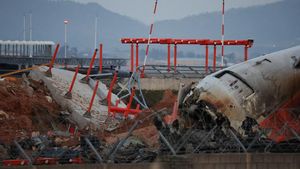The Moscow State Theatre Lenkom is undergoing significant leadership changes, marking the introduction of two key positions: president and artistic director. This move has come after several years of uncertainty following the death of the theatre's famed leader, Mark Zakharov, who passed away on September 28, 2019. The announcement, made on January 22, 2024, has sparked both hope and concern within the theatre community.
Mark Varshaver, who previously held the position of director at Lenkom since 1987, has been appointed the theatre's president. Vladimir Pankov, recognized as a meritorious artist of the Russian Federation, will take on the role of artistic director. Dmitry Berestov, the leader of the Theatre on the Southwest, has been named the new director of Lenkom.
Before these appointments, the theatre was operating under significant strain. Following Zakharov's death, Varshaver, as the established director, was left to manage the theatre's operations without having the guidance traditionally provided by both an artistic director and president. It was noted by the Moscow Department of Culture, the organization overseeing the theatre, "Varshaver will become president of the theatre and will continue to oversee its development. This similar practice has already been used for the curation of capital theatres: Alexander Shirvindt was the president of the Satire Theatre for many years."
The introduction of these new positions is seen as necessary to address longstanding issues within the theatre's operations and creative leadership. Notably, actors and associates have voiced concerns over management styles and the overall direction of the theatre. Dmitry Pevtsov, a celebrated Russian artist, previously criticized the internal dynamics under Varshaver's leadership, openly stating, "The theatre ‘Lenkom’ is deteriorated and heading for disaster under the current director who doesn’t allow all the actors to perform if they disagree with his views."
Following the announcement, Pevtsov remained tight-lipped about the current changes at Lenkom. When asked about the restructuring, he remarked, "I prefer to remain silent now." His comments reflect the complex emotions within the theatre, particularly as some former members have felt marginalized or sidelined during Varshaver's prior tenure.
Adding to the tensions within Lenkom, the theatre faced public allegations concerning the treatment of its notable actors. Pevtsov revealed he was removed from the theatre, alongside others, hinting at internal crises. He asserted, "These actions are part of the systemic issues faced by the theatre". It was reported by various outlets, including NEWS.ru, about the frustrations expressed by Alexandra Zakharova, daughter of the late Mark Zakharov. She claimed she was also removed from the theatre, pointing to what she described as a troubling internal crisis.
Internally, the theatre had previously adjusted its leadership structure, implementing the role of chief director. This role was held by Alexey Frandetti but was vacated by him voluntarily by June 2024, leaving yet another vacancy. Varshaver's historic connection with Lenkom spans 45 years, and he transitioned from administrative roles to directorship, graduating from the Russian Institute of Theatre Arts (GITIS) as a theater economist.
Lenkom, originally founded as the Theatre of Working Youth on October 27, 1927, has been through various structural changes during its long history. Under Zakharov’s directorship, it became renowned for producing dynamic and innovative theatrical performances, cementing its place as a central cultural institution within Moscow. His legacy remains deeply significant, and the current anxiety about Lenkom's management is largely rooted in the respect and esteem he commanded.
After years of significant structural gaps, the appointment of Pankov—a former artistic director at the Center for Dramaturgy and Directing—is viewed by some as timely and necessary. There are high hopes among the theatre community for fresh perspectives and renewed vitality under new leadership.
Nevertheless, the incoming leadership challenges are substantial. Facing both external scrutiny and internal doubts, Pankov and Berestov must restore faith among actors, audiences, and critics alike. The Lenkom theatre community is watching closely, awaiting signs of rejuvenation and the potential to rise anew from the ashes of its recent turmoil.
Overall, the Lenkom theatre's new leadership marks both a turning point and renewal, as it seeks to chart its future path within Moscow's vibrant theatrical climate, aiming to honor the legacy of Mark Zakharov whilst embracing new visions for performance art.



